Book
ISBN: 1946527483 1946527246 Year: 2020 Publisher: Atlanta : Scholars Press,
Abstract | Keywords | Export | Availability | Bookmark
 Loading...
Loading...Choose an application
- Reference Manager
- EndNote
- RefWorks (Direct export to RefWorks)
Judaism --- Midrash rabbah --- Jewish theology --- Theology, Jewish --- Doctrines. --- Leviticus. --- Midrash --- Jewish literature --- Jewish sermons --- Rabbinical literature
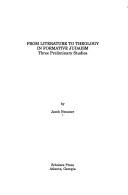
ISBN: 1555404200 Year: 1989 Publisher: Atlanta Scholars Press
Abstract | Keywords | Export | Availability | Bookmark
 Loading...
Loading...Choose an application
- Reference Manager
- EndNote
- RefWorks (Direct export to RefWorks)
Judaism --- Midrash rabbah --- Rabbinical literature --- History --- Criticism, interpretation, etc --- History and criticism
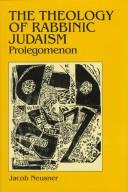
ISBN: 0788503863 Year: 1997 Publisher: Atlanta Scholars Press
Abstract | Keywords | Export | Availability | Bookmark
 Loading...
Loading...Choose an application
- Reference Manager
- EndNote
- RefWorks (Direct export to RefWorks)
Judaism --- Rabbinical literature --- Doctrines --- History and criticism --- Midrash rabbah. --- Talmud --- Theology. --- Theology.
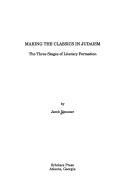
ISBN: 1555403778 Year: 1989 Publisher: Atlanta Scholars Press
Abstract | Keywords | Export | Availability | Bookmark
 Loading...
Loading...Choose an application
- Reference Manager
- EndNote
- RefWorks (Direct export to RefWorks)
Halakhic Midrashim --- Rabbinical literature --- History and criticism --- Theory, etc --- Midrash rabbah --- Criticism, Redaction.
Book
ISBN: 1555404987 Year: 1990 Publisher: Atlanta Scholars Press
Abstract | Keywords | Export | Availability | Bookmark
 Loading...
Loading...Choose an application
- Reference Manager
- EndNote
- RefWorks (Direct export to RefWorks)
Christianity and other religions --- Judaism --- Doctrines --- Relations --- Christianity --- Bible. --- Midrash rabbah. --- Sifrei. --- Criticism, interpretation, etc.
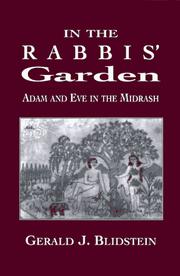
ISBN: 076575987X Year: 1997 Publisher: Jerusalem Aronson
Abstract | Keywords | Export | Availability | Bookmark
 Loading...
Loading...Choose an application
- Reference Manager
- EndNote
- RefWorks (Direct export to RefWorks)
In the Rabbis' Garden is a contemporary reflection on the midrashic comments to the story of Adam and Eve. It interprets --and reacts to-- midrash tat touches on the basic aspects of the human condition: guilt, virtue, responsibility, God, death, and sexuality, all rooted in the primal experience of Eden. (Foreword)
Adam --- Eve --- In rabbinical literature. --- In rabbinical literature. --- Bible. --- Midrash rabbah. --- Criticism, interpretation, etc. --- Criticism, interpretation, etc.
Book
ISBN: 9004332693 Year: 1992 Publisher: Leiden ; New York : E.J. Brill,
Abstract | Keywords | Export | Availability | Bookmark
 Loading...
Loading...Choose an application
- Reference Manager
- EndNote
- RefWorks (Direct export to RefWorks)
This book is a comparative study in the hermeneutics of the ancient interpretations of the biblical Joseph story. Assuming that every interpretation results from a creative encounter between the ultimately open text of Scripture and the specific thought world of the interpreter, it examines the particular way in which each exegete construes the biblical outline of Joseph's character. Paying special attention to the literary nature of the sources, the study begins with an analysis of the narrative methods and the hermeneutic potential of the biblical story, and then proceeds to the inter-testamental evidence. The central concern of this study is to compare the different interpretations of the philosopher Philo, the historian Josephus and the Midrash Genesis Rabbah. These sources do not only range over a considerable amount of time but significantly derive respectively from the Greek and Hebrew cultural realm. Consequently, their figures of Joseph fulfil distinctly different purposes, ranging from an idealisation of Joseph as a Hellenistic politician to autobiographical apologetics and religious instruction.
Patriarchs (Bible) --- Biography --- History and criticism. --- Joseph --- Philo, --- Josephus, Flavius. --- Bible. --- Midrash rabbah. --- Criticism, interpretation, etc., Jewish. --- Criticism, interpretation, etc.
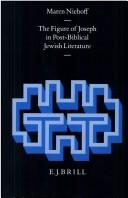
ISBN: 900409556X Year: 1992 Publisher: Leiden Brill
Abstract | Keywords | Export | Availability | Bookmark
 Loading...
Loading...Choose an application
- Reference Manager
- EndNote
- RefWorks (Direct export to RefWorks)
Patriarchs (Bible) --- Biography --- History and criticism --- Joseph, --- Philo, --- Josephus Flavius. --- Bible. --- Midrash rabbah. --- Criticism, interpretation, etc., Jewish. --- History and criticism. --- Criticism, interpretation, etc.
Book
ISBN: 3161547039 9783161547034 9783161547027 3161547020 Year: 2016 Publisher: Tübingen, Germany
Abstract | Keywords | Export | Availability | Bookmark
 Loading...
Loading...Choose an application
- Reference Manager
- EndNote
- RefWorks (Direct export to RefWorks)
Genesis Rabbah, the earliest rabbinic commentary on the book of Genesis, was composed in Roman Palestine around the fifth century CE and continued to be studied throughout medieval and modern times. In this volume, an international team of scholars explores the literary formation and textual transmission of this work as well as the historical, cultural, religious, and political contexts in which it was composed. -- From back cover.
Rabbinical literature --- History and criticism --- Midrash rabbah. --- Criticism, interpretation, etc. --- Religion --- Antiquity --- rabbinic literature --- Jewish Studies --- Midrash --- Biblical Interpretation --- Antike Religionsgeschichte --- Religionswissenschaft --- Altes Testament --- Antike
Book

ISBN: 9789462581623 9462581622 Year: 2016 Publisher: Zwolle WBooks
Abstract | Keywords | Export | Availability | Bookmark
 Loading...
Loading...Choose an application
- Reference Manager
- EndNote
- RefWorks (Direct export to RefWorks)
Wat hebben het Jodendom, Christendom en de Islam gemeen? Het zijn niet alleen monotheïstische religies, maar ook religies van het boek. Men gelooft in het bestaan van één God, die de wereld heeft geschapen en zich in zijn worden heeft geopenbaard aan de mens. Die woorden, dat zijn de openbaringen in een heilig boek, dat zich vanwege diezelfde goddelijke oorsprong onderscheidt van alle andere boeken: de Tanach, de Bijbel en de Koran.
Comparative religion --- Writing --- Bible --- Book history --- Islam --- Korans --- Judaism --- religion [discipline] --- Bibles --- Sacred books. --- Midrash rabbah. --- Bible. --- Qurʾan. --- Books, Sacred --- Sacred literatures --- Religious literature --- Holy Scriptures (Bible) --- Midrash rabah ʻal ha-Torah --- Pentateuch (Midrash rabbah) --- Torah (Midrash rabbah) --- Ḥumash (Midrash rabbah) --- 297.181 --- 094:22 --- 094:296 --- 094:296 Oude en merkwaardige drukken. Kostbare en zeldzame boeken. Preciosa en rariora-:-Judaïsme. Jodendom --- Oude en merkwaardige drukken. Kostbare en zeldzame boeken. Preciosa en rariora-:-Judaïsme. Jodendom --- 094:22 Oude en merkwaardige drukken. Kostbare en zeldzame boeken. Preciosa en rariora-:-Bijbel --- Oude en merkwaardige drukken. Kostbare en zeldzame boeken. Preciosa en rariora-:-Bijbel --- 297.181 Islam: canonieke boeken; Koran --- Islam: canonieke boeken; Koran --- Exhibitions --- Biblia. --- Qur'ans --- Al-Coran --- Al-Qur'an --- Alcorà --- Alcoran --- Alcorano --- Alcoranus --- Alcorão --- Alkoran --- Coran --- Curān --- Gulan jing --- Karan --- Koran --- Koranen --- Korani --- Koranio --- Korano --- Ku-lan ching --- Ḳurʼān --- Kurāna --- Kurani --- Kuru'an --- Qorān --- Quräan --- Qurʼān al-karīm --- Qurʺon --- Xuraan --- Κοράνιο --- Каран --- Коран --- קוראן --- قرآن --- Sacred books

 Search
Search Feedback
Feedback About UniCat
About UniCat  Help
Help News
News